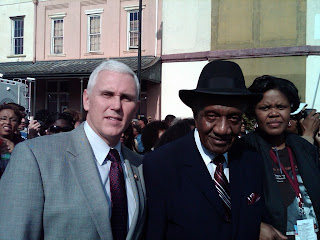
Congressman Mike Pence participated in the 2010 Congressional Civil Rights Pilgrimage, which took place from March 5—7 with stops in Birmingham, Selma and Montgomery, Alabama. This year marks the 45th Anniversary of Bloody Sunday, one of the most pivotal events of the civil rights movement. Congressman Pence joined Senator Sam Brownback (R-KS) and Congressman John Conyers (D-MI) in serving as honorary co-leaders and Congressman Artur Davis (D-AL) and Congressman Spencer Bachus (R-AL) were the honorary co-hosts. Congressman John Lewis (D-GA) served once again as the Pilgrimage Chairman.

Congressman Mike Pence participated in the 2010 Congressional Civil Rights Pilgrimage, which took place from March 5—7 with stops in Birmingham, Selma and Montgomery, Alabama. This year marks the 45th Anniversary of Bloody Sunday, one of the most pivotal events of the civil rights movement. Congressman Pence joined Senator Sam Brownback (R-KS) and Congressman John Conyers (D-MI) in serving as honorary co-leaders and Congressman Artur Davis (D-AL) and Congressman Spencer Bachus (R-AL) were the honorary co-hosts. Congressman John Lewis (D-GA) served once again as the Pilgrimage Chairman. | Congressman Pence recalled his trip to Selma, AL, and the 10th Congressional Civil Right Pilgrimage today at events across his district as he spoke about, "Our Debt To History: Remember Those Who Went Before."
Montgomery, Alabama March 7, 2010 By Mike Pence
Last weekend our family had the privilege of joining colleagues from both political parties on a walk through the historic sites of the Civil Rights movement in Montgomery and Selma, Alabama. We will never forget the experience. I served as co-leader of the 10th Congressional Civil Rights Pilgrimage sponsored by the Faith & Politics Institute.
We arrived in Montgomery on Saturday afternoon and made our way to the home church of Dr. Martin Luther King, Jr. Sitting in the front pew at the Dexter Avenue Baptist Church in Montgomery, Alabama, we heard from Dorothy Cotton about her years working with Dr. King. She spoke of the faith that sustained their work and the historic importance of music and singing to the movement.
We then made our way to the Civil Rights Memorial, where our kids were given the privilege of laying a wreath to honor those who had lost their lives in the struggle for equality, and into the nearby museum with its inspiring displays of history. But it was the personal stories of segregation, told by the people who lived it and peacefully fought against it, that were most moving to us. Hearing firsthand accounts of how African Americans in the South were systematically denied the right to vote, intimidated, beaten and even killed fighting for that right will never leave us.
The next day, we traveled with my colleague and legendary civil rights leader, Congressman John Lewis to Selma, Alabama. John Lewis was personally recruited by Dr. King as a college student and his courage and moral authority continue to inspire millions.
John took us to Selma to mark the anniversary of a day that changed his life and America: March 7, 1965, also known as "Bloody Sunday."
As John recounted that momentous day, he told of how he and several hundred courageous activists crossed the Edmund Pettus Bridge in Selma during a march on the state capitol and were beaten by state police waiting on the far side of the bridge. |
The images of that day were transmitted around the world and would sear the conscience of the nation. It set the stage for more protests and was the catalyst for Congress to enact the Voting Rights Act later that year.
We gathered for worship at Brown Chapel in Selma, and after a rousing service, we left the church to walk to the Edmund Pettus Bridge. As a leader of the trip, I had the privilege to walk at the front of the march with John Lewis and other congressmen and dignitaries and I had the great honor of walking the entire way alongside Dr. F.D. Reese, pastor of the Ebenezer Baptist Church in Selma.
As we began the march, I asked Dr. Reese if he could tell me about that day 45 years ago, and he did. As we strolled the historic route, surrounded by thousands, I was enthralled by this pastor's description of that fateful day. He said that when they reached the crest of the bridge and could see the other side of the river, the first thing they saw was the state police waiting to stop the march. He said, "All you saw was a sea of blue," but still they marched.
I asked if they thought of turning back when they saw the array of police. He smiled and said, "No, we had prayed at the Brown Chapel and decided we would go on regardless." And so they did.
After pausing at the base of the bridge for prayer, he told me how the tear gas and the beatings with night sticks overtook the crowd. My friend John Lewis was among those most severely beaten.
As our march came to an end, I extended my hand to Dr. Reese and thanked him not only for what he had done for the civil rights movement, but I thanked him for what he, John Lewis and others had done for America that day. Dr. Reese replied humbly, "God did something here." And through these brave Americans, I believe that with all my heart.
Every American should know the story of Montgomery and Selma. Thanks to courageous Americans like Dr. Martin Luther King, Jr., Congressman John Lewis, Dorothy Cotton and F.D. Reese, these cities have become an integral part of the American story in our nation's unrelenting march toward a more perfect union.
TEXT and IMAGE CREDIT:
mikepence.house.gov Washington D.C. Office 100 Cannon HOB Washington, DC 20515 (p) 202 225-3021 (f) 202 225-3382









No comments:
Post a Comment